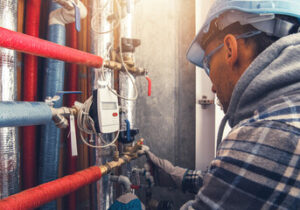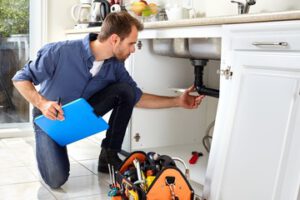Plumbers Lexington is a full-service plumbing company. They’re available 24/7 and offer a variety of different services to their clients. Whether you have a clogged drain, leaky fixture, or water heater repair, the right plumber will do the job quickly and at a fair price. The right plumber will take the time to listen and understand your needs so that you can expect prompt service and exceptional work.
 Many people find plumbers through word-of-mouth referrals from family and friends. Having a good reputation is an important factor when choosing a plumber. If a plumber is known for doing quality work at a fair price, they will often get repeat business from satisfied customers. On the other hand, plumbers with a poor reputation for cutting corners and ripping off customers will usually need help finding new clients.
Many people find plumbers through word-of-mouth referrals from family and friends. Having a good reputation is an important factor when choosing a plumber. If a plumber is known for doing quality work at a fair price, they will often get repeat business from satisfied customers. On the other hand, plumbers with a poor reputation for cutting corners and ripping off customers will usually need help finding new clients.
Another factor to consider when choosing a plumber is how long they have been in business. It is important to hire a company that has been in business for a long time so they have the experience and knowledge to do quality work.
In today’s marketplace, consumers scour the internet for plumbing contractors that are well-rated and reviewed. A recent study revealed that 86% of consumers read online reviews before purchasing. For this reason, it is essential that your plumber marketing strategy includes a strong focus on reputation management.
Licensing
If you want to work in the plumbing profession, then you must be licensed by your local government. Licensing requirements vary from state to state, but most require you to pass an exam and complete certain amount of education. You must also be proficient at reading blueprints and understand local codes and ordinances regarding home construction and plumbing. You can find information about licensing requirements in your state online. Some states offer certifications for plumbers, which will enhance your employment opportunities and increase your pay scale.
You can pursue a plumber’s license through a formal union or trade apprenticeship, an accredited vocational school, or on-the-job experience under a master plumber. Depending on your jurisdiction, it may take up to five years of apprenticeship or journeyman work before you can apply for a master plumber’s license. Most plumbing apprenticeship programs include classroom instruction, hands-on training, and supervised field experience. In addition, you must pass a written and practical examination.
The exam for a New York City plumbers’ license is different from the one for other states because the municipality has its own unique rules. In some cases, you must wait until you’re employed in the city to sit for an exam. You can find information about the exam and the required documents on the New York City Department of Buildings website.
Before you begin your plumbing career, it’s helpful to study plumbing codes and regulations, which are often complex and change frequently. You can also talk with experienced plumbers in your area and ask them how they prepared for their exams. It’s also a good idea to attend trade and continuing education courses that will help you gain the skills you need to become an expert plumber.
Having an expert plumber on hand will ensure that you receive the highest quality service. They will be able to diagnose problems quickly and fix them properly. They will also ensure that the job is done safely and according to industry standards. Moreover, they will have the tools and equipment needed to perform the job. Lastly, they will be able to provide you with accurate estimates and guarantees that are backed by the Department of Buildings.
Experience
A plumbing expert has a wide body of knowledge that they apply to every job they take on. This includes plumbing math, the ability to read blueprints, and an intimate understanding of water systems and water conservation, among other things. They also have extensive training in the use of specialized tools and the ability to handle complex repairs.
Whether it’s a frozen pipe or a clogged toilet, it’s important to call an expert plumber as soon as possible. Trying to fix a problem yourself can lead to further damage and expensive repair costs. Expert plumbers have the knowledge and tools to diagnose problems quickly and accurately, saving you time and money.
A qualified expert plumber will have years of experience working on various types of plumbing systems. They will have worked on both residential and commercial projects, and will know how to properly install and service pipes and fixtures. Additionally, a skilled plumber will be familiar with the latest regulations and codes governing plumbing in your area.
Many people don’t realize that there are a number of different types of plumbing professionals. Some only think of a plumber as someone who fixes clogged toilets or leaky faucets. However, a plumber’s duties actually encompass much more than that. They can work as a plumbing contractor or own their own business, and can do both new construction and repairs.
To become a licensed plumber, you will need to undergo extensive training and apprenticeship. This usually takes four to five years and consists of classroom learning and on-the-job training. Once you have completed your apprenticeship, you will need to fulfill your state’s requirements for licensing. You may choose to advance to a journeyman plumber with additional on-the-job experience, or you may choose to continue your education and pursue the title of master plumber. Most states require a plumber to pass an exam in order to obtain their license. In some cases, you will need to provide proof of your license before you will be allowed to work on any plumbing projects. You may also be required to attend continuing education classes in order to maintain your license.
Insurance
Whether you’re a professional plumber or just starting out in the industry, you need to invest in some important insurance policies. These are often required by the state to get a license and can help you avoid costly lawsuits. Depending on your specific business needs, you can choose from many different types of plumbers’ insurance. Some of them are mandatory and others are recommended, but all of them can protect you in the event of a lawsuit.
General liability insurance protects plumbers from property damage that may occur on the job site. This can include anything from a client tripping over equipment to plumbing damage to an existing structure or third-party’s property. General liability can also cover expenses for medical costs and lawsuits that arise from accidents at the job site.
Errors and omissions insurance, or professional liability, is another type of plumber’s insurance that covers legal costs and damages arising from claims of negligence or mistakes. It’s important to have this coverage as even the smallest error can lead to expensive litigation. For example, if you mismeasured the amount of pipes to install in a home remodel and the house floods, the homeowner could sue you for the damages.
Commercial general liability insurance, or CGL, is also recommended for plumbers as it protects your business from another person or company’s claim of bodily injury, associated medical costs and damages to property. This is especially important as plumbers work in residential homes and businesses, which means they’re more likely to come into contact with customers.
Tools and equipment insurance covers the cost to replace or repair your plumbing tools and equipment if they’re lost, stolen or damaged. Many plumbers have a large amount of expensive and specialized equipment that they need to perform their job, so having this type of coverage is essential.
Business auto insurance is important for plumbers because they frequently use vehicles to travel between jobs. This coverage can help pay for repairs and replacements if your vehicle is involved in an accident or a work-related incident. It can also cover the cost of a rental car if you need one while your vehicle is being repaired or replaced.


 In 2016, the Department of Buildings (DOB) introduced Local Law 152 which requires that all buildings with exposed gas lines undergo regular inspections to ensure their safety. While it took a few years for the DOB to finalize the details of this law, it is now in full effect with new requirements regarding how often buildings must be inspected, who can perform the inspections, and more.
In 2016, the Department of Buildings (DOB) introduced Local Law 152 which requires that all buildings with exposed gas lines undergo regular inspections to ensure their safety. While it took a few years for the DOB to finalize the details of this law, it is now in full effect with new requirements regarding how often buildings must be inspected, who can perform the inspections, and more.